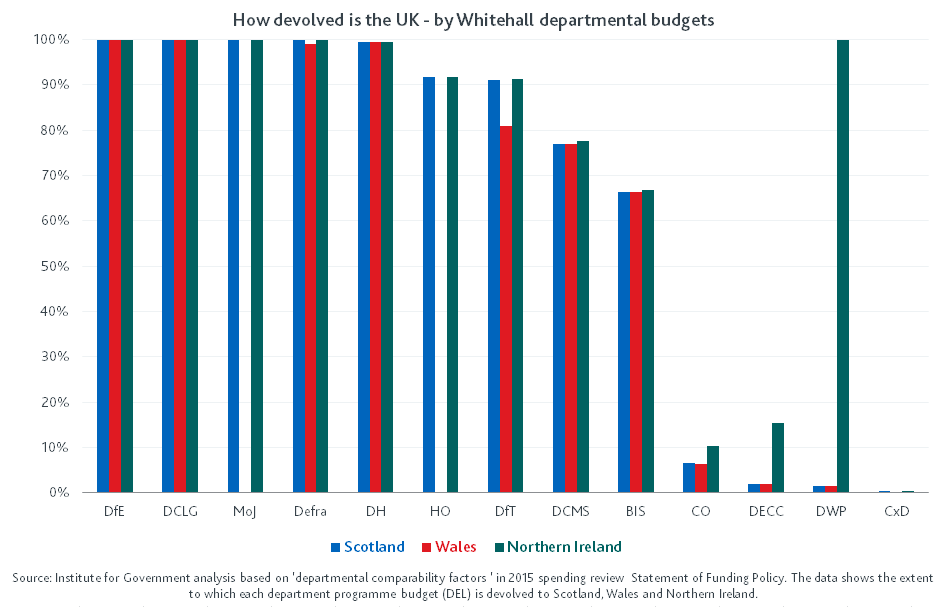Barnett and beyond: time for a new system for funding devolution?
Last Wednesday’s Autumn Statement and Spending Review set out spending limits for the rest of the parliament, not only for UK government departments but also for the separate Scottish, Welsh and Northern Ireland governments. Akash Paun explains how this works, and how it’s growing more complicated.

Whitehall. Image credit: Emma Swann CC BY-NC-ND 2.0
While departmental budgets across Whitehall are the product of negotiations with the Treasury the devolved governments, in theory at least, have their budgets calculated automatically by reference to changes in English spending via the Barnett Formula. A little-read annex to the Spending Review called the Statement of Funding Policy (SFP) provides the detail. This document categorises each policy programme across Whitehall, according to whether it is devolved to Scotland, Wales and Northern Ireland. If so, the devolved governments receive a proportionate share of any extra cash (or cuts) the department is given.
As education is fully devolved, this means the governments of Scotland, Wales and Northern Ireland receive 100% of the per capita increase in the Department for Education budget. For the Home Office, Scotland receives 92% while Wales receives 0%, reflecting the devolution of policing to Edinburgh but not Cardiff. The chart below shows the different territorial profile of each domestic department.
The formula-and-grant system is defended as a way to set the devolved budgets without complex negotiation and conflict between the governments. In practice, however, there are some judgements to be made about how programmes are classified, which can be the source of disagreement. For instance, spending on the London Olympics was classified as a UK-wide programme. This led to a dispute in the last parliament between the UK and devolved governments, with the latter arguing that investment in infrastructure in East London was an English matter that should trigger additional funds for them. In this Parliament, the Welsh Government may query the fact that HS2 spending is classified as an England-and-Wales matter, meaning that Scotland and Northern Ireland gain more from the increased transport infrastructure budget than Wales.
The Barnett system has no basis in either legislation or formal intergovernmental agreement, as is the case with fiscal arrangements in many federal countries. Interpreting the formula and calculating the budget ‘consequentials’ for the devolved governments therefore lies in the hands of the Treasury alone. In the event of a difference of view, there is an established dispute resolution mechanism, but all this can do is try to broker a compromise: in the end, the Treasury cannot be overruled.
The UK government also retains the prerogative to bypass the formula – as it did recently in agreeing a new package of funding for Northern Ireland, as part of the negotiations to get power-sharing in Belfast back on track. And while the headline figures are published, there is limited transparency about how those figures are actually calculated: Barnett is often described as a “black box”.
These features of the system have led to calls over the years for reform, perhaps involving an independent body that could oversee the system of devolution finance and report publicly on how budgets are set, enhancing accountability and scrutiny. More radical would be to dump Barnett altogether, in favour of a needs-based funding system.
The UK government has not hitherto accepted the case for change, but reforms to the devolution arrangements may strengthen the case in favour. Different fiscal powers are being devolved to each of the three non-English territories, including corporation tax to Northern Ireland, and income tax to Scotland and (in a more restricted way) to Wales. This will require agreement on how the devolved block grants are adjusted to account for the new revenue-raising powers. Wales is also to get a ‘funding floor’ so that the Welsh block grant does not fall below 115% of comparable spending per head in England.
But the biggest challenges concern Scotland, which is gaining significant welfare as well as tax functions. Agreeing how to adjust the block grant in year one will be tricky enough. But consensus will also be needed on this adjustment should vary in subsequent years – the cross-party Smith Commission concluded only that it should be “indexed appropriately”. There is also to be a ‘no detriment’ principle applied, meaning that budgets should be further adjusted to compensate for cross-border effects of policy decisions taken by the UK or Scottish governments. And Scotland will have enhanced borrowing powers, requiring the agreement of fiscal rules with the Treasury. The detail of all this is still being negotiated between the two governments.
Last Wednesday, all the Chancellor told the House about these negotiations was that the “ball is in the Scottish Government’s court”, indicating that the two sides are still some distance apart. Failure to reach agreement may derail the whole Scottish devolution package, as the Scottish Government says it will veto passage of the legislation if the fiscal framework is not satisfactory. Passage of the devolution proposals through the House of Lords must also still be negotiated.
The UK government will hope that clear rules for all this can be agreed, and that devolution finance can then revert to operating on a largely automatic basis. But the increasing complexity of the system significantly raises the potential for disputes, given the number of different calculations and interpretations to be made. Political differences between the administrations may also create incentives to go public with disputes, destabilising relations at a time when the governments need to work together to implement the new settlement.
The four governments of the UK are currently engaged in a broader review of intergovernmental relations, which is taking place in parallel to the UK–Scottish fiscal negotiations. In both cases Whitehall is likely to be sceptical of radical change, but the time may have come to rethink the UK’s intergovernmental arrangements, particularly on fiscal issues.
—
Note: Abbreviations for government departments used in the chart can be found here. This article originally appeared on the Institution for Government blog. It gives the views of the author, and not the position of Democratic Audit, nor of the London School of Economics. Please read our comments policy before posting.
—
 Akash Paun is a Fellow at the Institute for Government
Akash Paun is a Fellow at the Institute for Government






 Democratic Audit's core funding is provided by the Joseph Rowntree Charitable Trust. Additional funding is provided by the London School of Economics.
Democratic Audit's core funding is provided by the Joseph Rowntree Charitable Trust. Additional funding is provided by the London School of Economics.
Barnett and beyond: time for a new system for funding devolution? https://t.co/h2ek0tmWlJ
What logic is there in giving Barnett consequentials for #HS2 to Scotland but not Wales? At least it goes North https://t.co/5WjZUwaujJ
Scotland & NI to get Barnett consequentials for #HS2 – add another £7Bn to the cost. https://t.co/5WjZUwaujJ
@democraticaudit @instituteforgov @AkashPaun In order to get rid of Barnett do all of the countries in the UK need to have a haircut?
Barnett and beyond: Is it time for a new system for funding devolution? https://t.co/PVpLzjIx5d
Barnett and beyond: time for a new system for funding devolution? https://t.co/uSeR3FyQk9
Barnett and beyond: time for a new system for funding devolution? https://t.co/PVpLzjIx5d
How devolution is funded. My @instituteforgov blog reposted by @democraticaudit at https://t.co/tftZzXZXCI https://t.co/c6kv5eOqDS
Barnett and beyond: time for a new system for funding devolution? https://t.co/w0hZacira3 https://t.co/gegjW97iEa